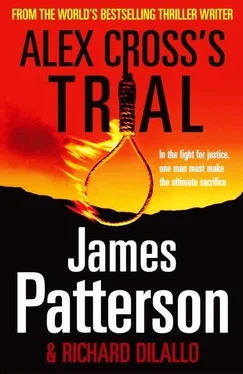James Patterson,
Richard DiLallo
ALEX CROSS’S TRIAL
2009
A PREFACE TO TRIAL
by Alex Cross
A few months after I hunted a vicious killer named the Tiger halfway around the world, I began to think seriously about a book I had been wanting to write for years. I even had the title for it: Trial . The previous book I’d written was about the role of forensic psychology in the capture of the serial killer Gary Soneji. Trial would be very different, and in some ways even more terrifying.
Oral history is very much alive in the Cross family, and this is because of my grandmother, Regina Cross, who is known in our household and our neighborhood as Nana Mama. Nana’s famous stories cover the five decades when she was a teacher in Washington – the difficulties she faced during those years of civil rights turmoil, but also countless tales passed on from times before she was alive.
One of these stories – and it is the one that stayed with me the most – involved an uncle of hers who was born and lived most of his life in the small town of Eudora, Mississippi. This man, Abraham Cross, was one of the finest baseball players of that era and once played for the Philadelphia Pythians. Abraham was grandfather to my cousin Moody, who was one of the most unforgettable and best-loved characters in our family history.
What I now feel compelled to write about took place in Mississippi during the time that Theodore Roosevelt was president, the early part of the twentieth century. I believe it is a story that helps illuminate why so many black people are angry, hurt, and lost in this country, even today. I also think it is important to keep this story alive for my family, and hopefully for yours.
The main character is a man my grandmother knew here in Washington, a smart and courageous lawyer named Ben Corbett. It is our good fortune that Corbett kept first-person journals of his incredible experiences, including a trial that took place in Eudora. A few years before he died, Mr. Corbett gave those journals to Moody. Eventually they wound up in my grandmother’s hands. My suspicion is that what happened in Mississippi was too personal and painful for Corbett to turn into a book. But I have come to believe that there has never been a better time for this story to be told.
Part One
A GOOD MAN IS HARD TO FIND
“LET HER HANG until she’s dead!”
“Take her out and hang her now! I’ll do it myself!”
Bam! Bam! Bam!
Judge Otis L. Warren wielded his gavel with such fury I thought he might smash a hole in the top of his bench.
“Quiet in the court!” the judge shouted. “Settle down, or by God I will hold every last one of you sons of bitches in contempt.”
Bam! Bam! Bam!
It was no use. Warren’s courtroom was overflowing with disgruntled white citizens who wanted nothing more than to see my client hang. Two of them on the left side began a chant that was soon taken up by others:
We don’t care where.
We don’t care how.
We just wanna hang
Gracie Johnson now!
The shouts from some among the white majority sent such a shiver of fear through the colored balcony that one woman fainted and had to be carried out.
Another bang of the gavel. Judge Warren stood and shouted, “Mr. Loomis, escort all those in the colored section out of my courtroom and out of the building .”
I couldn’t hold my tongue another second.
“Your Honor, I object! I don’t see any of the colored folks being rowdy or disrespectful. The ones making the fuss are the white men in front.”
Judge Warren glared over his glasses at me. His expression intimidated the room into silence.
“Mr. Corbett, it is my job to decide how to keep order in my court. It is your job to counsel your client – and let me tell you, from where I sit, she needs all the help she can get.”
I couldn’t disagree.
What I once thought would be an easy victory in the case of District of Columbia v. Johnson was swiftly turning into a disaster for Gracie and her increasingly helpless attorney, Benjamin E. Corbett: that being myself.
Gracie Johnson was on trial for the murder of Lydia Davenport, a wealthy white woman who was active in Washington society at a level high enough to cause a nosebleed. Worse, Gracie was a black woman accused of killing her wealthy white employer.
The year was 1906. Before it was all over, I was afraid they were going to hang Gracie.
I had to be careful they didn’t hang me while they were at it.
“I WILL NOT TOLERATE another outburst,” Judge Warren said to the spectators. He turned to look me in the eye. “And I suggest that you, Mr. Corbett, select your objections with greater care.”
“Yes, Your Honor,” I said, then immediately held my tongue in check with my teeth.
“Mr. Ames, you may resume questioning the defendant.”
Carter Ames, the city attorney, was a little old man about five feet tall. He strode to the witness stand as if he were every inch of six-two.
“Now, Grace, let’s go back to the afternoon in question, May twenty-third. In your testimony – before the unfortunate disruption occurred – isn’t it true that you essentially admitted to murdering Mrs. Davenport?”
“Excuse me, sir, I said no such thing, ” Gracie shot back.
“The court stenographer will please read the testimony given by Miss Johnson a few moments before the courtroom interruption.”
“Got it right here, Carter,” the stenographer said.
Wonderful. Ames and the court stenographer were on a first-name basis. No telling which parts of Gracie’s testimony had been left out or “improved.”
The stenographer flipped back the pages in his tablet and began to read in a droning voice.
“Miz Davenport was always a mean old lady. Never had a nice word for anybody. Ask me, she had it coming to her. The day before she got killed, she told me she was fixing to fire me because I was too stupid to know which side of the plate do the fish fork go on. She was a mean old witch, she was. I’m telling you, she had it coming.”
I jumped up from my chair.
“Your Honor, obviously my client did not mean–”
“ Sit down, Mr. Corbett.”
I had one more thing to say – I just had to get it out.
“Your Honor, the prosecutor is deliberately twisting my client’s words!”
Carter Ames turned to me with a smile. “Why, Mr. Corbett, I’m not twisting a thing. Your client has spoken for herself very clearly. I have no further questions, Your Honor.”
“In that case, court will adjourn for a two-hour recess, so we can get ourselves a cold glass of tea and some dinner,” the judge said. “I believe that Mrs. Warren said my personal favorite, chicken pot pie, is on the menu today.”
Bam! Bam! Bam!
THE TWO-HOUR DINNER BREAK before Carter Ames and I gave our closing arguments seemed to last at least twice that long. I never had much appetite during a case, so I spent the interval pacing the block around the courthouse square, mopping my face and neck with a handkerchief.
Washington was in the grip of a torturous heat wave, and it was only June. The air was as thick and swampy as any summer afternoon back home in Mississippi. Carriage horses were collapsing. Society ladies called off their afternoon teas and spent their leisure time soaking in cool tubs.
Back home in Eudora I rarely had to wear the full lawyer suit with high stiff-starched collar and all the snaps and suspenders. Down south, folks knew how to survive the heat: move slowly, and wear light clothing.
Читать дальше












